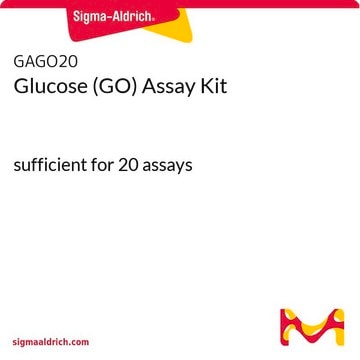MAK317
Sorbitol Dehydrogenase Assay Kit
sufficient for 100 colorimetric tests
Sign Into View Organizational & Contract Pricing
All Photos(1)
About This Item
UNSPSC Code:
12161503
NACRES:
NA.84
Recommended Products
detection method
colorimetric
relevant disease(s)
endocrinological disorders, diabetes; gastrointestinal diseases
storage temp.
−20°C
Related Categories
General description
Sorbitol Dehydrogenase (SDH) is an enzyme that catalyzes the interconversion of sorbitol and fructose. Elevated blood serum SDH levels indicate liver damage. Thus, SDH plays an important role in the diagnosis of liver disease, especially in combination with aminotransferases. SDH levels are also measured to evaluate diabetic complications such as proliferative diabetic retinopathy.
Sorbitol Dehydrogenase (SDH) is an enzyme that catalyzes the interconversion of sorbitol and fructose. Elevated blood serum SDH levels indicate liver damage; thus, SDH plays an important role in the diagnosis of liver disease, especially in combination with aminotransferases. SDH levels are also measured to evaluate diabetic complications such as proliferative diabetic retinopathy.
Features and Benefits
Compatible with high-throughput handling systems.
Suitability
Suitable for determining sorbitol dehydrogenase (SDH) activity in a number of biological samples such as plasma, serum, urine, tissue, and culture media.
Principle
Sorbitol dehydrogenase assay is a non-radioactive, colorimetric assay. It is based on the reduction of the tetrazolium salt MTT (3-[4, 5-dimethylthiazol-2-yl]-2, 5 diphenyl tetrazolium bromide) in a NADH-coupled enzymatic reaction. The reduced form of MTT exhibits an absorption maximum at 565 nm and the increase in absorbance at 565 nm is directly proportional to the enzyme activity. This assay is based on a kinetic reaction. Sorbitol dehydrogenase (SDH) activity can be determined in a number of biological samples (e.g., plasma, serum, urine, tissue, and culture media).
signalword
Warning
hcodes
Hazard Classifications
Eye Irrit. 2 - Flam. Liq. 3 - Met. Corr. 1 - Skin Irrit. 2 - STOT SE 3
target_organs
Respiratory system
Storage Class
3 - Flammable liquids
flash_point_f
75.2 °F - closed cup
flash_point_c
24 °C - closed cup
Certificates of Analysis (COA)
Search for Certificates of Analysis (COA) by entering the products Lot/Batch Number. Lot and Batch Numbers can be found on a product’s label following the words ‘Lot’ or ‘Batch’.
Already Own This Product?
Find documentation for the products that you have recently purchased in the Document Library.
The current state of serum biomarkers of hepatotoxicity.
Ozer J, et al.
Toxicology, 245(3), 194-205 (2008)
Luciana F Brito et al.
Applied microbiology and biotechnology, 104(11), 5095-5106 (2020-04-11)
Gene repression using the endonucleolytically deactivated dCas9 protein and sgRNAs (CRISPR interference or CRISPRi) is a useful approach to study gene functions. Here, we established CRISPRi in Paenibacillus sonchi genomovar Riograndensis SBR5, a plant growth promoting bacterium. CRISPRi system with
Pathophysiology of diabetic retinopathy.
Tarr J M, et al.
ISRN ophthalmology (2013)
Our team of scientists has experience in all areas of research including Life Science, Material Science, Chemical Synthesis, Chromatography, Analytical and many others.
Contact Technical Service








